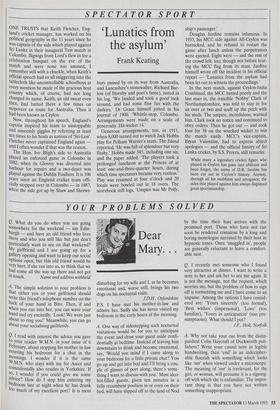SPECTATOR SPORT
`Lunatics from the asylum'
Frank Keating
ONE TRUSTS that Keith Fletcher, Eng- land's cricket manager, has worked on his political geography in the 11 years since he was captain of the side which played against Sri Lanka in their inaugural Test match in Colombo. Bigwigs from Lord's flew in for a celebration banquet on the eve of the match and were none too amused, I remember still with a chuckle, when Keith's official speech had us all sniggering into the tablecloth like uncontrollable schoolboys at every mention he made of the gracious host country which, of course, had not long changed its name. Keith, an old sweat even then, had batted there a few times on stopovers en route for Australia. Then it had been known as Ceylon. Now, throughout his speech, England's captain inspired his team to unstoppable and unseemly giggles by referring at least ten times to his hosts as natives of `Sri-Lon'. Fletcher never captained England again and I often wonder if that was the reason.
The Hon. No Bligh's side to Australia Played an enforced game in Colombo in 1882, when its Glenroy was diverted into harbour for repairs and a two-dayer was played against the Dublin Fusiliers. It is 106 Years since an England cricket team offi- cially stopped over in Colombo — in 1887, when the side got up by Shaw and Shrews- bury passed by on its way from Australia, and Lancashire's stonewaller, Richard Bar- low (of Hornby and poet's fame), noted in his log, 'We landed and took a good look around, and had some fine fun with the darkies.' Dr Grace himself jotted in his journal of 1900, `Whistle-stop, Colombo. Arrangements were made on a scale of generosity. Hit-wicket 14.' Generous arrangements, too, in 1911, when 8,000 turned out to watch Jack Hobbs play for Pelham Warner's team. The Island reported, `He was full of splendour but very flashy.' Hobbs made 345, including one six, and the paper added, 'The players took a prolonged luncheon at the Princes of at least one-and-three-quarter hours, during which time spectators became very restless.' Play was resumed at four o'clock and 20 locals were bowled out in 18 overs. The scorebook still logs, 'Umpire was Mr Polly, ship's passenger.'
Douglas Jardine remains infamous. In 1933, his MCC side against All-Ceylon was barracked, and he refused to restart the game after lunch unless the perpetrators were ejected. Eight were — and the rest of the crowd left, too, though not before tear- ing the MCC flag from its mast. Jardine himself wrote off the incident in his official report — 'Lunatics from the asylum had been let out to witness the proceedings.'
In the next match, against Ceylon-India Combined, the MCC batted poorly and the last man in, the irascible `Nobby' Clark of Northamptonshire, was told to stay in for an over or two and scuff up the pitch with his studs. The umpire, incredulous, warned him. Clark took no notice and continued to obey orders. Then he got out — and took four for 38 on the wrecked wicket to win the match easily. MCC's vice-captain, Bryan Valentine, had to express abject apologies — and the official history of Sri Lanka cricket, by S.S. Perera, still remarks:
While many a legendary cricket figure who played in Ceylon has gone into oblivion and been forgot, the name of D.R. Jardine has been cut out in Ceylon's history. Anyway, through all his snobbism and arrogance, the sides that played against him always displayed great sportsmanship.


























































 Previous page
Previous page